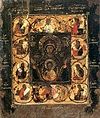

| Previous day | Next day |
| Old Style
March 8
|
Saturday |
New Style
March 21
|
|
3rd Week of Great Lent. Third Saturday of Great Lent. Commemoration of the Dead.
Tone 6.
Great Lent. |
Wine and oil allowed.
|
![]() St. Theophylactus, bishop of Nicomedia (842-845).
St. Theophylactus, bishop of Nicomedia (842-845).
Apostle Hermas of the Seventy (1st c.). Hieromartyr Theodoretus, priest, of Antioch (361-363). Sts. Lazarus, founder (1391) and Athanasius, monk (15th c.), of Murmansk Monastery (Karelia). St. Andronicus (Lukash), schema-archimandrite of Tbilisi, Georgia, elder of Glinsk Monastery (1974).
“Kursk Root” Icon of the Sign of the Most Holy Theotokos (1898).
St. Felix of Burgundy, bishop of Dunwich and enlightener of East Anglia (ca. 648). Martyrs Quintilian and Capatolinus, at Nicomedia. St. Julian, archbishop of Toledo (690). St. Paul the Confessor, bishop of Plousias in Bithynia (ca. 840). St. Tarasius the Wonderworker, of Lycaonia.
Repose of Blessed Basiliscus of Uglich (1863) and Archbishop Vitaly (Maximenko) of Eastern America (1960).
Thoughts for Each Day of the Year
According to the Daily Church Readings from the Word of God
By St. Theophan the Recluse

Saturday. [Heb. 10:32–38; Mark 2:14–17]
I came not to call the righteous, but sinners to repentance (Mark 2:17). Through the mouth of Wisdom the Lord called the foolish to Himself. He Himself wandered upon the earth, calling sinners. Neither the proud, “clever ones,” nor the self-willed and righteous have a place with Him. Let intellectual and moral weakness rejoice! Mental and active power, step aside! Total weakness that acknowledges itself as such and hastens with faith to the Lord Who healeth the weak and filleth the impoverished, will become strong both intellectually and morally, but will continue to acknowledge both its intellectual poverty and evil inclinations. The power of God, under this unprepossessing cover and made perfect in weakness, invisibly creates a different person who is bright mentally and morally. This brightness is often manifest here, but it is always manifest there, in heaven. Behold what is hidden from the wise and prudent and is revealed only to babes (cf. Matt. 11:25)!
Articles
 Apostle Hermas of the SeventyThe Holy Apostle Hermas of the Seventy was bishop at Philippopolis, and died a martyr in the first century. |
 Hieromartyr Theodoritus of AntiochSaint Theodoritus was a presbyter and keeper of sacred vessels at the cathedral church in Antioch. |
 Venerable Athanasius of MuromSaint Athanasius was igumen at the monastery of Saint Lazarus during the mid-fifteenth century. |
 Icon of the Mother of God “Kursk-Root”The Kursk Root Icon of the Mother of God “Of the Sign” is one of the most ancient icons of the Russian Church. |





